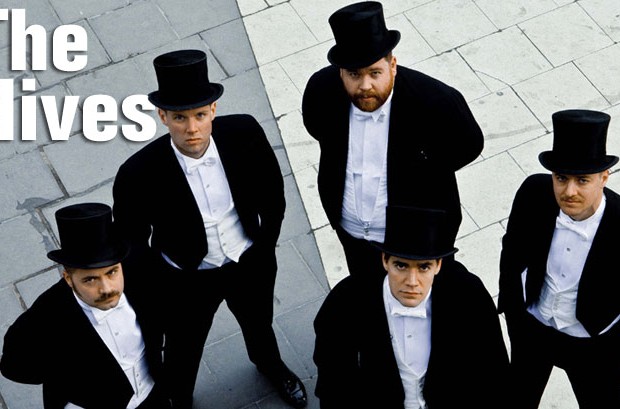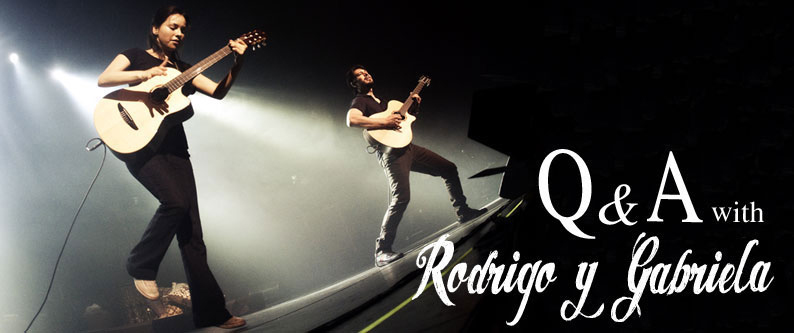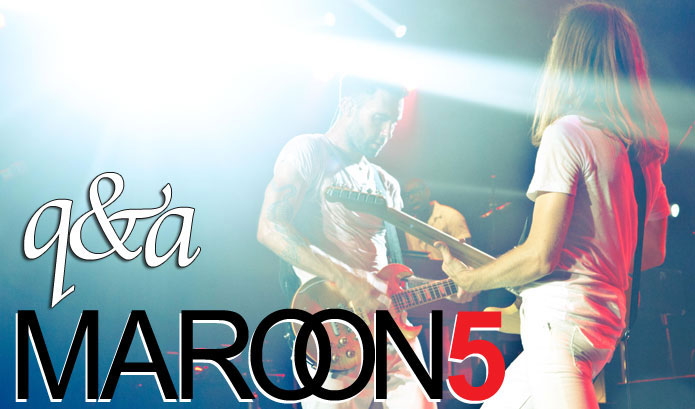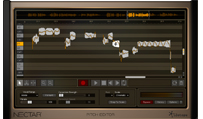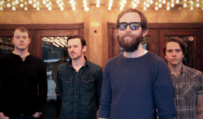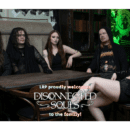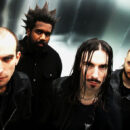By Andy Kaufmann
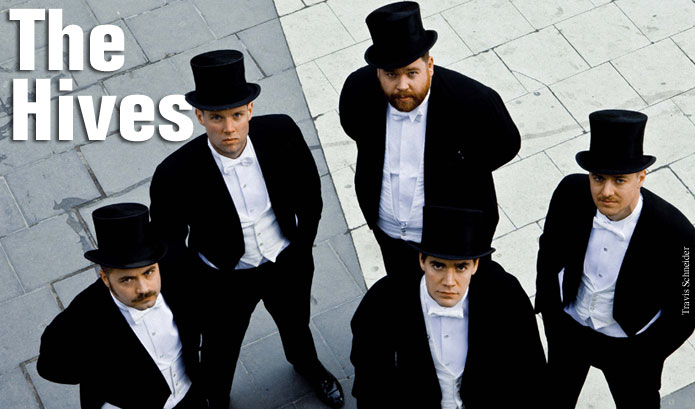
On June 5th, fans of cheeky garage punk will rush to purchase the Hives’ fifth full-length recording, Lex Hives, the Swedish group’s first self-funded album, and first since 2007. Notorious for innovative promotional techniques as much as for unrelentingly fierce and fun live performances, the record’s track-listing was revealed as part of a word jumble contest via the band’s website. As the black-and-white-clad hooligans made their way to a featured performance at this year’s Coachella Festival near Palm Springs, CA, brash vocalist Howlin’ Pelle Almqvist spoke with Music Connection about style, slang and the rush of performing live.
Music Connection: Congratulations on your new album. It doesn’t disappoint.
Pelle Almqvist: Thank you. I’m glad you liked it. It took us a long time to make. It was definitely tough, but we’re happy with it and that’s always better than not being happy.
MC: This is the first album you’ve done without a label.
Almqvist: Yeah, it’s true. It’s the first time we’ve done our own label [Disque Hives]. We sort of have several labels. It’s on our own label, but we have label partners who help out. It’s not like we press up CDs ourselves. The way we see it, we’re getting the best of both worlds.
“Try to be your own favorite band. Figure out what that band would sound, look and be like and then become that band.”
MC: Did having a different type of label situation affect the sound of this album?
Almqvist: No, I don’t think it did. They’re separate, the business and pleasure part. One of them is like personal hygiene––you kind of just do it at home in the morning and don’t talk much about it. The other part is the music and the actual creative bit and that’s the reason we have to do the business. If we don’t do the business, we have no music, so we have to get through both.
MC: How have fans reacted to the album’s new material?
Almqvist: Really great. We get a great reaction whenever we play, actually. People jump up and down from the first second and learn the chorus by the third. We’ve always had direct songs, too, which we’ve always liked. I think that’s the sign of a successful rock song, when you know what it’s about within the first three seconds.
MC: Do you ever change your set list according to the audience’s reaction?
Almqvist: Yeah, absolutely. Our art as a live band is that the audience is very much a part of it. It’s not a one-way thing. Our shows become better if the audience is excited and therefore we try our best to make the audience excited by putting the right song in the right place and structuring the shows to where everybody can like it all the way through. It just makes for a way better show. If we just played 15 beats it’d probably be a good show, but the crowd wouldn’t know all the songs. We know they want to hear us play our hits, but they’re our most successful songs probably because they’re our best ones.
MC: Your songs are extremely catchy. When you write songs, do you consciously think about hooks that are going to stick in the listener’s head?
Almqvist: Well, we like catchy songs. We try to make it catchy, but we’re not that big into melody. It’s not about having a big chorus or all these typical songwriting tricks that people use. It’s about making it catchy just by finding a hook and going with it. You want people to understand the music, but you also want to have a touch of originality and not just do the expected things in the right parts.
MC: One of the things that make the Hives original is the look that you change for every tour. How do you agree on what you’re going to wear for a particular tour?
Almqvist: It’s very much a collaborative thing, putting together the outfit. And the fact that we always do them in black and white gives it a kind of continuity even though we change it up quite a bit. It was very important for us, from the beginning, to be a band that was easily recognizable, both in look and sound. Everything about the band was supposed to be instant. You could know we were the Hives just by looking at us four miles away or just hearing a few chords. That’s what we’ve always strived for––a strong identity.
MC: Tell us a bit about your website. There’s so much funny writing on it. Which of you is the major contributor?
Almqvist: Well, we all write there, but I guess Nicholaus [Arson] and Chris [Dangerous] are the main ones who come up with most of the lingo. That language is something we were always really interested in. You watch American movies and there’s different slang. You watch English movies, there’s other slang. We were always very interested in slang from different parts of the English speaking world. How they talked in movies from the ‘50s, how they talked in movies from the ‘70s. We were always interested in language in that way. We just like slang. English is such a rich language.
MC: Do you guys all have to approve something before it goes up on the web?
Almqvist: Nah, we trust each other. I don’t even think all of us read! We’re free to write whatever we want on there. If it really went to hell, we’d know it, I think.
MC: How do you come up with the concepts for your highly stylized videos?
Almqvist: I don’t know. How do you come up with an idea at all, really? Something’s in your head and you think, maybe this’ll be a cool video. Then we throw it back and forth until it’s something. We’ve always loved the art of the rock video since we were young. It seemed like a big part of what bands do. I know some bands hate it, but we always thought it was this neat thing to have a job where you get to make a short film and you get to make a t-shirt, you get to make all these things that don’t have that much to do with the actual job. It’s just a bonus that we get to make videos.
MC: The Scrutinized Press section of your site, where you turn the tables on reviewers, is great. Was that your answer to an abundance of misinformed journalists?
Almqvist: Yeah, I think it was. It was bothering us that the press always gets the last word. No matter how witty you were in an interview, if they didn’t like you they can just cut out all that stuff and put in what they said instead. We were going to film the interviews and edit them ourselves.
We have all these high concepts that are way too much work, so we never did. Scrutinized Press is not really the success we would have hoped it to be, because we don’t do it enough. But we got to do a couple and they’re really fun.
My favorite part of the website is where people write about when they met us, The Time I Met The Hives bit. That was pretty fun.
MC: You really involve your fans with things like contests. Our favorite is the one where you had fans dress up like the band. Where do these ideas come from?
Almqvist: It’s not like we need a contest, therefore we make a contest. We’ll find a cool prize––like we’re going to give away our old tour van––but we don’t know what the competition is yet. Mostly, we’ll come up with a contest like descrambling song names. We thought that was really fun. But we have the greatest fans. They come up with really creative solutions to things.
MC: Have you been able to tell whether your contests have had a measurable impact on your popularity? Have you seen ticket sales and record sales go up since you’ve started doing those sorts of promotions?
Almqvist: Well, more web traffic, certainly, or more friends on Facebook and stuff like that. I don’t know that much about ticket or album sales. I couldn’t say, really. But definitely it’s increased our web presence.
MC: Do you have any new ideas for contests?
Almqvist: Usually, the best ones are where you do it in really broad strokes, like they have to come up with a story as to why they should win. The best contests ask [fans] to do something creative instead of just raffling it away. That’s not nearly as fun. People come up with the coolest stuff. Like, what about a contest where there was a poster that you could print and you had to put it in a weird place and take a photo of it? That would be really good.
MC: Not that long ago, you suffered a concussion as a result of a performance mishap. What happened? Are you fully okay now?
Almqvist: Yeah, I’m okay now. I’m fully recovered. I climbed up on a lighting rig. I was trying to jump down and my foot caught in some cabling or something. I’ve been doing stuff like this for 10 years and nothing bad ever happened. I guess I thought that meant that after 10 years you’re kind of invincible. But this time, it didn’t work. I fell straight between the stage and the lighting rig. This was a really high festival stage, so we were probably three or four meters above ground, and I landed on my head. By some miracle, all I got was a concussion. I woke up and people looked really spooked. There was a doctor who asked me if I wanted to continue playing and I felt fine, so I did.
But it turns out that if you get a concussion you shouldn’t listen to anything loud, you shouldn’t see any bright lights, you should just lie in a quiet, dark room. What I did was jump back on stage in front of 50,000 fans with a strobe light in my face and a guitar amp behind my back. It probably wasn’t the best thing for my recovery. Afterwards, the doctor said I probably got a concussion, so they put me on a stretcher and brought me to some high-tech medical facility in Switzerland where I spent a few days.
MC: Tell us a little about the Hives’ merch. You guys sell everything from buttons to onesies for babies. Is that something you developed as a way to deal with the state of the industry and Internet piracy?
Almqvist: We thought it was cool to be a band like KISS. There’s something funnily larger than life about having your own pinball game and things with your logo on it. We wanted to have as much merch as possible. That takes time to develop, but the more the merrier is the way I look at it. I want everything with a Hives logo on it. I’d make a Hives house if I could.
MC: How do you feel about the fact that artists have been reduced, monetarily speaking, to mere fronts for t-shirt shops?
Almqvist: People don’t realize how hard it is for a mid-level band. We do okay, because we’re popular and get good money playing shows. But for a mid-level band, it’s way harder now to make money. You used to have a label that made a lot of money off of you selling albums and also paid you because you sold a lot of albums. The fact that they made a lot of money meant they could pay tour support so you could live on the road. Basically, you’re left with merchandise and now labels and venues are trying to get a cut of the merchandise. There are too many fingers in the pie. I think more labels and venues should leave bands alone in that respect.
MC: Tell me how the Christmas song you did with Cyndi Lauper came about.
Almqvist: It was all pretty fast. We were at a bar eating dinner, I think, and one of her songs came on the radio. We said, oh, we love Cyndi Lauper. Our manager was there and she said she knew Cyndi Lauper and you should send her an email asking if she wants to do a duet. We did and she said yes. We didn’t have a song when we asked her. A couple of months later, a Christmas song came about. When it did, it was not long before Christmas, so we were in a hurry if we were going to get it out. I was in New York and the band was in Cleveland and the band recorded the basic tracks. I flew in from New York and sang and Cyndi was playing shows through Stockholm just a few days after. She came to the studio, we convinced her to sing those awful lyrics and we got it out just in time for Christmas. It was all such a whirlwind that I don’t remember a lot about it being made, but it was something we always wanted to do, a duet with Cyndi Lauper and a Christmas song, so why not combine them?
I think all Christmas songs should sound like Phil Spector. I’m not into metal Christmas records. Christmas songs should have that nostalgic sheen and that Phil Spectorish ‘60s chord structure. That really works for Christmas music.
MC: Do you have any advice for musicians?
Almqvist: The most important thing is knowing what you want and how you want to sound. Most of the people who ask me for advice say, “What should we do? What should we sound like?” It really has to come from you. That’s the trick. You have to figure out what you want. Basically, try to be your own favorite band. Figure out what that band would sound, look and be like and then become that band.
MC: Looking at the big picture, what’s most important to you?
Almqvist: What’s important to me is that we’re touring again. It’s my favorite thing in the world. It’s almost like a religious experience, being on stage with the Hives. I’ve realized that’s what I want to do with my life and that’s it. I don’t need much more than that. I’m going to keep riding this horse until it falls over.
Contact Brady Brock @ GoldVE Inc, 212-741-2400, bradyb@goldve.com

